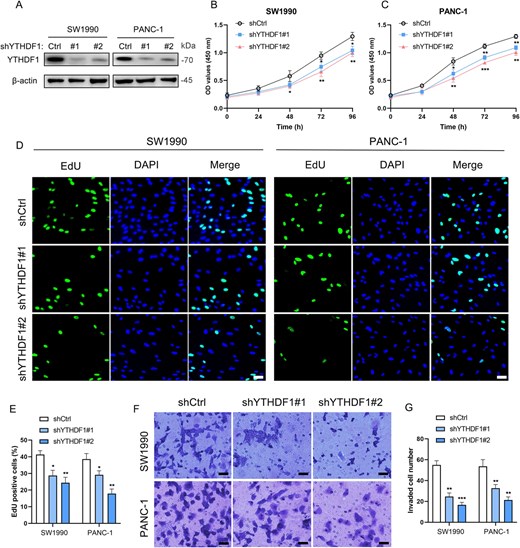-
Views
-
Cite
Cite
Chunyang Wang, Kai Huang, Jie Yang, Qingchun Xu, Jiagao Kuai, Guangxian Zhang, Xiaoming Wang, YTHDF1 promotes pancreatic cancer cell progression by enhancing SF3B2 translation though m6A modification, The Journal of Biochemistry, 2025;, mvaf018, https://doi.org/10.1093/jb/mvaf018
Close - Share Icon Share
Abstract
N6-Methyladenosine (m6A), a pivotal RNA modification, plays a critical role in carcinogenesis across multiple cancer types. YT521-B homology domain family protein 1 (YTHDF1), a binding protein of m6A, facilitates the translation of downstream targets via m6A recognition. However, the involvement of YTHDF1 in pancreatic cancer progression and its mechanistic underpinnings remain poorly understood. In this study, we observed significant upregulation of YTHDF1 in pancreatic cancer cell lines (SW1990 and PANC-1) compared to the normal human pancreatic cell line hTERT-HPNE. Functional assays revealed that YTHDF1 knockdown markedly suppressed cell proliferation and invasion, whereas its overexpression enhanced these malignant phenotypes in both SW1990 and PANC-1 cells. Mechanistically, YTHDF1 interacted with coding sequence (CDS) region of splicing factor 3B subunit 2 (SF3B2), whereas YTHDF1 downregulation reduced SF3B2 protein levels without altering its mRNA expression, suggesting post-transcriptional regulation via m6A modification. Importantly, SF3B2 overexpression rescued the suppressed proliferation and invasion caused by YTHDF1 knockdown in SW1990 and PANC-1 cells. Collectively, our findings demonstrate that YTHDF1 drives pancreatic cancer progression by enhancing SF3B2 translation through m6A modification, thereby providing novel mechanistic insights and a potential therapeutic target for pancreatic cancer.





